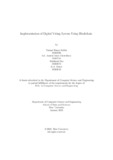| dc.contributor.advisor | Rahman, Dr. Md. Khalilur | |
| dc.contributor.advisor | Monim, Mr. Mobashir | |
| dc.contributor.author | Sabbir, Naimul Hasan | |
| dc.contributor.author | Islam Chowdhury, Md. Amirul | |
| dc.contributor.author | Das, Rishikesh | |
| dc.contributor.author | Mukit, K.A. | |
| dc.date.accessioned | 2023-12-05T06:18:26Z | |
| dc.date.available | 2023-12-05T06:18:26Z | |
| dc.date.copyright | 2023 | |
| dc.date.issued | 2023-01 | |
| dc.identifier.other | ID: 18301136 | |
| dc.identifier.other | ID: 18301254 | |
| dc.identifier.other | ID: 18301074 | |
| dc.identifier.other | ID: 18301043 | |
| dc.identifier.uri | http://hdl.handle.net/10361/21918 | |
| dc.description | This thesis is submitted in partial fulfillment of the requirements for the degree of Bachelor of Science in Computer Science and Engineering, 2023. | en_US |
| dc.description | Cataloged from PDF version of thesis. | |
| dc.description | Includes bibliographical references (pages 46-48). | |
| dc.description.abstract | Electronic voting has evolved over time as a viable alternative to traditional paper based voting in order to decrease redundancies and anomalies. Traditional voting
has not pleased the public or government officials in recent years. They are not com pletely secure because ballots are easy to tamper with. It also raises concerns about
voter security and transparency. Blockchain technology can play an important role
in overcoming these issues as it is based on a decentralized system with peer-to peer network architecture. One of the most common causes of electoral fraud, vote
manipulation, can be reduced by incorporating blockchain into e-voting systems.
This study proposes a comprehensive design and implementation of an e-voting sys tem that utilizes blockchain technology and validator nodes to ensure security and
transparency. The system comprises a user-friendly frontend for voter registration
and login, and to maintain the voter’s anonymity, we utilized the Keccak-256 en cryption method. The proposed system is structured in three layers, namely the
district layer, the divisional layer, and the election commission layer, each of which
is protected by its own set of validator nodes. It also utilizes a smart contract to
register voters, facilitate the voting process, as well as assign them a unique voter
ID. Validator nodes in each layer verify the authenticity of the votes based on their
predefined set of conditions. The result aggregation process is safeguarded by a set
of validator nodes that validate the integrity of the results. The proposed system
is evaluated in terms of security, transparency, and scalability. The implementation
of the system using the Ethereum blockchain platform is described, and the results
of the evaluation are presented. The system is found to be secure against common
attacks such as Sybil attacks and double-voting. The system is also found to be
scalable, as it can handle a large number of voters and voting stations. | en_US |
| dc.description.statementofresponsibility | Naimul Hasan Sabbir | |
| dc.description.statementofresponsibility | Md. Amirul Islam Chowdhury | |
| dc.description.statementofresponsibility | Rishikesh Das | |
| dc.description.statementofresponsibility | K.A. Mukit | |
| dc.format.extent | 48 pages | |
| dc.language.iso | en | en_US |
| dc.publisher | Brac University | en_US |
| dc.rights | Brac University theses are protected by copyright. They may be viewed from this source for any purpose, but reproduction or distribution in any format is prohibited without written permission. | |
| dc.subject | E-voting | en_US |
| dc.subject | Blockchain | en_US |
| dc.subject | Peer-to-Peer network | en_US |
| dc.subject | Decentralized system | en_US |
| dc.subject | Ethereum | en_US |
| dc.subject | Smart contract | en_US |
| dc.subject | Keccak-256 | en_US |
| dc.subject.lcsh | Blockchains (Databases) | |
| dc.title | Implementation of digital voting system using blockchain | en_US |
| dc.type | Thesis | en_US |
| dc.contributor.department | Department of Computer Science and Engineering, Brac University | |
| dc.description.degree | B.Sc. in Computer Science and Engineering | |

